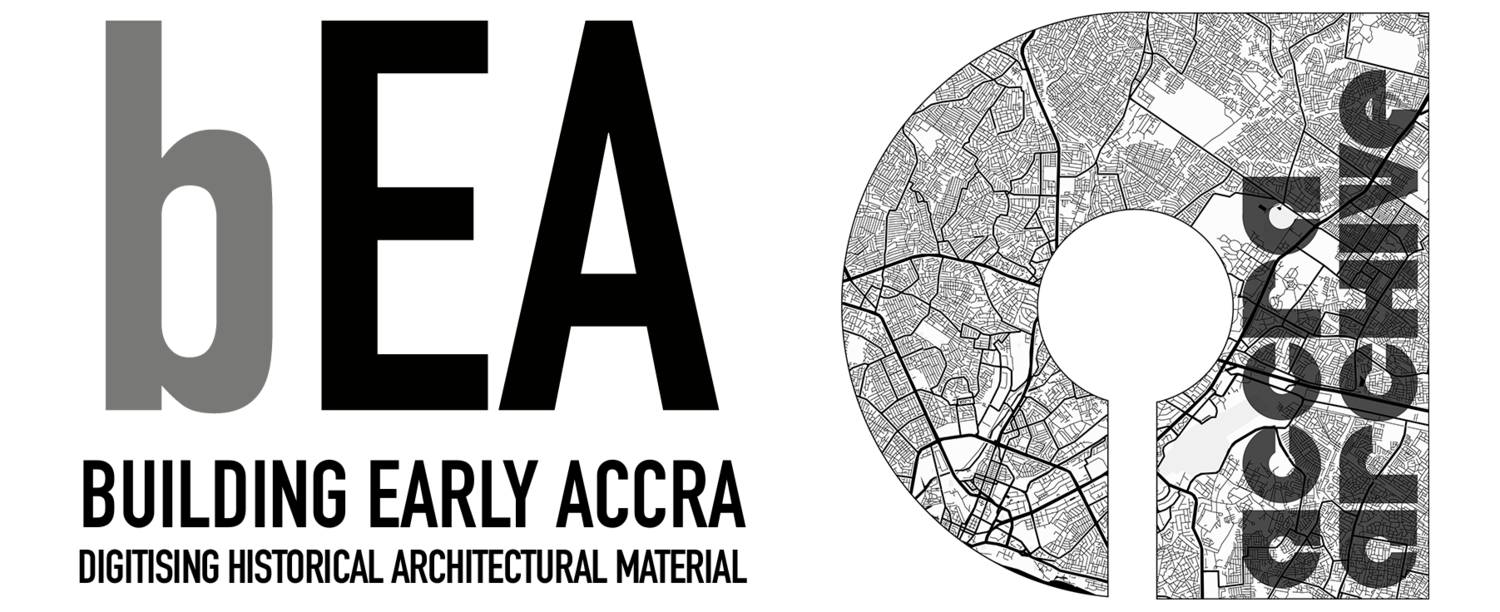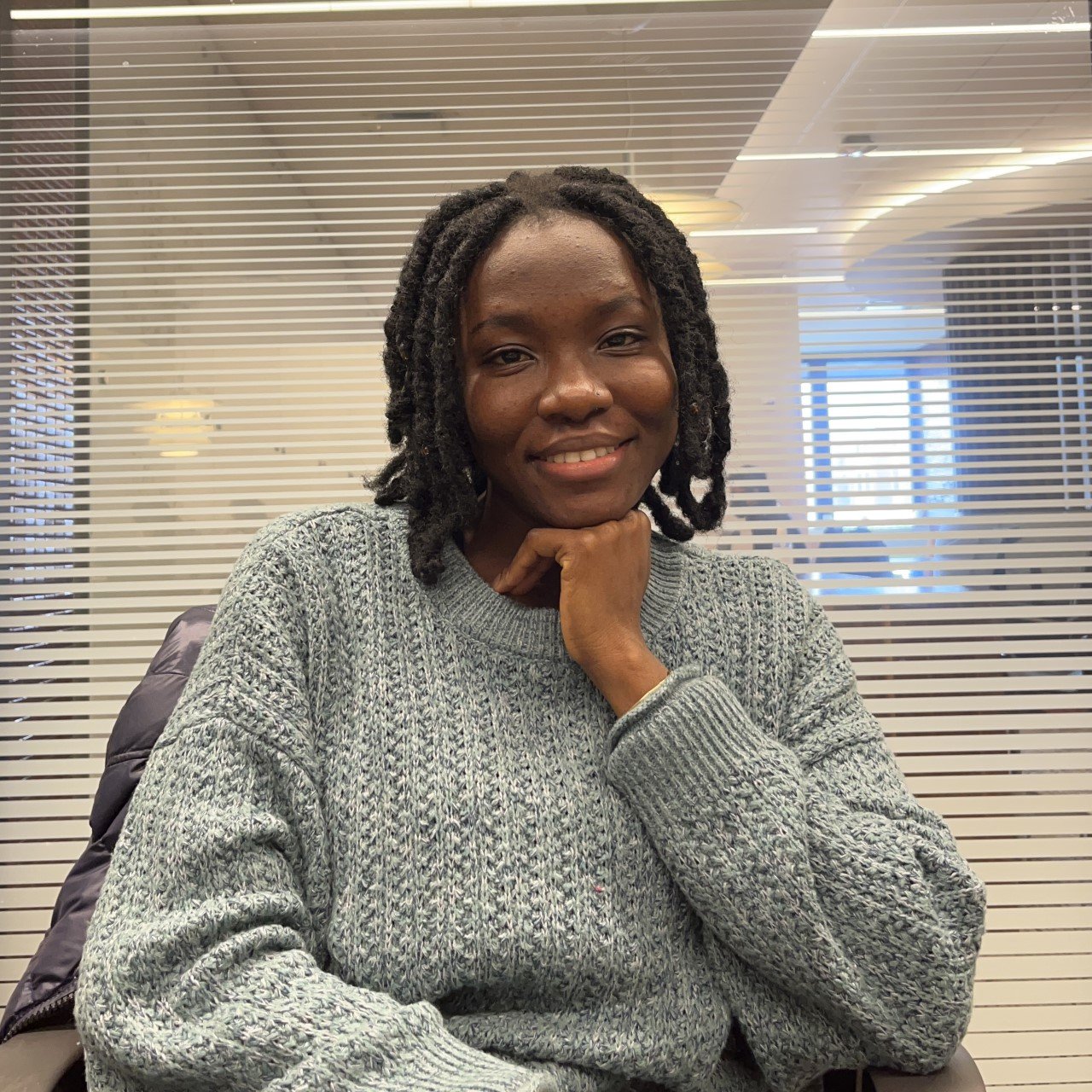The Sugar Babies in the Accra Town Hall
Reflections on Urban Leisure and Space-making
By Fauziyatu Moro
2nd Place Winning Entry of the imagining Early Accra competition (Adult Category)
About: This is an expository essay on the evolution of leisure and space in colonial Accra. It details how the Sugar Babies, a concert party troupe formed in Nima, gained access to the Accra Town Hall for performances in colonial Accra. It is inspired by an oral interview the author conducted in Nima, one of the earliest copies of a photo of the Accra Town Hall, and supported by archival sources from the Public Records Archive and Administrative Department (PRAAD) as well as secondary literature on concert parties in Ghana.
The image below shows photographs of the same building serving different purposes at different points in Accra’s urban history. The building, known to many today as the “Old Parliament House”, is pictured from the top as the office of the Commission on Human Rights and Administrative Justice (CHRAJ) today, in the middle as Ghana’s Parliament House after independence, and in the bottom image as the Accra Town Hall during the colonial period.
In January this year, I embarked on preliminary research on cinema in Nima and happened to speak to Mr. Abdullahi Ibrahim Baro, a 92-year-old habitant of the town. My conversation with him dwelled generally on life in Nima than it did on the movie-going culture there since he was not an avid cinemagoer in his youth. His favourite pastime was performing in a concert party troupe.
In 1953 Mr. Baro and other young men and women from Nima formed a Hausa concert party group called the Sugar Babies. Their performances were in Hausa since their audience came from working-class people of Nima and neighbouring migrant communities. The Sugar Babies held its rehearsals in the compound of a benevolent woman in Nima, while the main performances took place in events spaces in Tudu and inside the Old Parliament House (then the Town Hall). This revelation came as a surprise to me since I was unaware that the Old Parliament house once served as an events space. Inspired by this knowledge, I set out to understand the historical workings of this space.
According to the book Accra-Tema in Pictures, the Town Hall, located on the High Street, was built in the colonial period and doubled as an entertainment hub for various concert party groups as well as the legislative home of the Gold Coast, and after independence became the country’s first Parliament House. Documents from the archives show that the Parliament House was moved to the present location after deliberations with cabinet members in the 1960s, after which the Town Hall became known to Ghanaians as the “Old Parliament House”, and subsequently repurposed as the office of the CHRAJ.
The brief historical background above provides knowledge of the transition of the status of the “Old Parliament House” over time. More importantly, and as far as the focus of this essay is concerned, it also lays the foundation for investigating the process through which the Sugar Babies used the Town Hall for their shows in the colonial period. As such, the paper conceptualizes the use of the Town Hall by the working class for recreation and explores how that lends insights into the evolution of Accra.
According to the musicologist John Collins, concert parties emerged in the Gold Coast right after World War I, and he defines them as “…groups of itinerant artists who stage vernacular shows for the rural and urban audiences that combine slapstick musical comedies, folk stories, acrobatics, moral sermons, magical displays and dance-music sessions.” The most common venues for concert party shows in urban areas were town halls such as the Accra Town Hall. In rural areas, schools, chapels, and family-house compounds were used as concert party venues. At the highpoint of the colonial period, the Accra Town Hall, unlike other venues such as drinking bars, night clubs and cinema houses that served the general public, was strictly a high-class entertainment venue for the town’s elite. As such there was a clear demarcation of space-use in colonial Accra along class lines which in effect rendered some leisure forms in the city, such as concert parties, the preserve of the upper and middle classes.
However, in the 1920s there was a shift in the accessibility of leisure in the Gold Coast when new and emerging concert party troupes rivalled the existing established troupes who performed only to elite audiences by performing to the general public. At the time there existed distinct shows staged by the Yalley concert party which was for the elite and those by the Accra Vaudeville and Bob Johnson concert party which were for the working class. By the 1930s, this shift had taken a stronghold with its influence transcending audiences to venues. More concert party troupes emerged and performed to working-class audiences in spaces hitherto reserved to elite audiences and the Accra Town Hall was one such space. Among these new concert party troupes was the Sugar Babies which held its performances in the Accra Town Hall for Hausa men and women, most of whom came from Nima.
Nima in 1953. Photo by Ullstein Bild via Getty Images
This transformation which took place in the Gold Coast prompts an appreciation of urban leisure and how it propels cities to expand to accommodate the ‘underdogs’ of the existing population. In one of his videos titled “What is Urban Studies?: A View from Oxford Street” Ato Quayson remarked that “…what might be seen as entirely ordinary or quotidian, looked in another way, actually divulges interest in spatial principles” and the case of the Sugar Babies affirms his assertion. It has shown that space-making includes access to spaces, and an assessment of the ways in which the working-class [living in migrant communities] in Accra accessed spaces for leisure could yield valuable insights into the evolution of Accra in the colonial period.
Conclusively, it could be argued that the transition of the Town Hall from a space that served the leisure needs of the upper and middle classes to one that served the general public in the colonial period inspired its subsequent use for services to the masses, irrespective of class; i.e. as the nation’s first parliament house and now as the office the Commission on Human Rights and Administrative Justice (CHRAJ).
References
Primary
Interview with Mr. Abdullahi Ibrahim Baro, in Nima, on 15th January, 2021.
“New Parliament House”: Record Group Files, RG5/1/382, Public Records Archives and Administrative Department (PRAAD-Accra).
Secondary
Accra-Tema in Pictures. Compiled and Published by Advance Publishing Company Ltd. and Printed by Advance Press Ltd., Accra, 1969.
Ansaa-Adjei, Abyna. Ghana at 50. National Planning Committee, Ghana at 50, 2007.
Cole, Catherine M. Ghana’s Concert Party Theatre. Bloomington: Indiana University Press, 2001.
Collins, John, “The Ghanaian Concert Party,” African Quarterly on the Arts Vol.1, no. 4 (1996), pg. 85-88.
—————., “The Ghanaian Concert Party: African Popular Entertainment at the Crossroads”. PhD thesis, Faculty of Graduate Studies of the State University of New York at Buffalo, 1994.
The Cultural Encyclopedia. “Ghana’s Concert Party Theatre.” Accessed March 25, 2021. https://www.culturalencyclopaedia.org/ghana-s-concert-party-theatre-book
“What is Urban Studies?: A View from Oxford Street.” YouTube Video, 44:58. “Critic.Reading.Writing with Ato Quayson,” January 24,2021. https://www.youtube.com/watch?v=XlJ6rpFgLsw&t=12s&ab_channel=Critic.Reading.WritingwithAtoQUAYSON
About the Author: Fauziyatu Moro (Fauzi) is a PhD student of African History at the University of Wisconsin-Madison focusing on mobility and identity (re)formation in (post-)independent Ghana and the African Sahel.
Migrant (women’s) accounts have played a key role in Fauzi’s creative and academic work in the past. In 2020 she was shortlisted for the Abena Korantemaa Oral History Prize for her entry on migrant Sissala women living in Accra, Ghana, and in 2021 served as the project coordinator and principal investigator for the LOATAD flagship women’s oral archive which captured, among other stories, the lived migratory experiences of women from the coastal regions of Ghana.
“Sugar Babies in the Accra Town Hall: Reflections on Urban Leisure and Space-making” for which she placed 2nd in the Building Early Accra competition, was inspired by her larger on-going research on popular culture mediums in migrant spaces in Accra. She is currently working on her first poetry collection on women’s migration in Ghana titled Hybrid, part of which was presented at the International Association for the Study of Forced Migration Biannual Conference in 2021.




